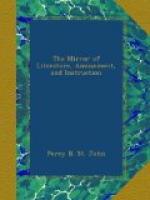between barbarism and tyranny on the one side, and
civilization and freedom on the other: that which
was death in the former, is but court disgrace in
the latter. George IV. was not cruel—he
had even a certain susceptibility; the spectacle of
human suffering revolted him: but suffering to
affect him must have been present to his sense.
Was Henry VIII. gratuitously cruel? That does
not appear. He took no pleasure for itself in
shedding blood, and avoided being a witness of it.
Had he been obliged to look on whilst Anne Boleyn
and Sir Thomas More were bleeding, he probably would
have spared them. He sacrificed them to his impulses
from mere selfish indifference. With their wives
and mistresses Henry VIII. and George IV. were governed
by the same self-indulgent despotism—the
same animal disgusts. Henry VIII. had six wives,
and sent one to the scaffold as the prelude to his
marriage with another. George IV. had only one
wife, but she suffered the persecutions of six; and
if she escaped decapitation or divorce, it was from
no failure of inclination or instruments. Henry
VIII. was the tyrant of his people, and George IV.
was not: yet is there even here a similitude.
Both surrendered their understandings to their ministers,
upon the condition of subserviency to their personal
desires. What George would have been in the age
of Henry it might be ungracious to suppose; but it
may be asserted that Henry, had he been reserved for
the close of the eighteenth century, would have a
very different place in opinion and history as a king
and as a man,—such are the beneficent, humanizing
influences of knowledge, civilization, the spirit of
religious tolerance, and laws mutually guarding and
guarded by public liberty!”
* * * *
*
AN ECLIPSE AT BOOSSA.
(From Landers’ Travels, vol. ii.)
“About ten o’clock at night, when we were
sleeping on our mats, we were suddenly awoke by a
great cry of distress from innumerable voices, attended
by a horrid clashing and clattering noise, which the
hour of the night tended to make more terrific.
Before we had time to recover from our surprise, old
Pascoe rushed breathless into our hut, and informed
us with a trembling voice that ’the sun was dragging
the moon across the heavens.’ Wondering
what could be the meaning of so strange and ridiculous
a story, we ran out of the hut half dressed, and we
discovered that the moon was totally eclipsed.
A number of people were gathered together in our yard,
in dreadful apprehension that the world was at an
end, and that this was but the ‘beginning of
sorrows.’ We learnt from them that the
Mahomedan priests residing in the city, having personified
the sun and moon, had told the king and the people
that the eclipse was occasioned through the obstinacy
and disobedience of the latter luminary. They
said that for a long time previously the moon had
been displeased with the path she had been compelled




